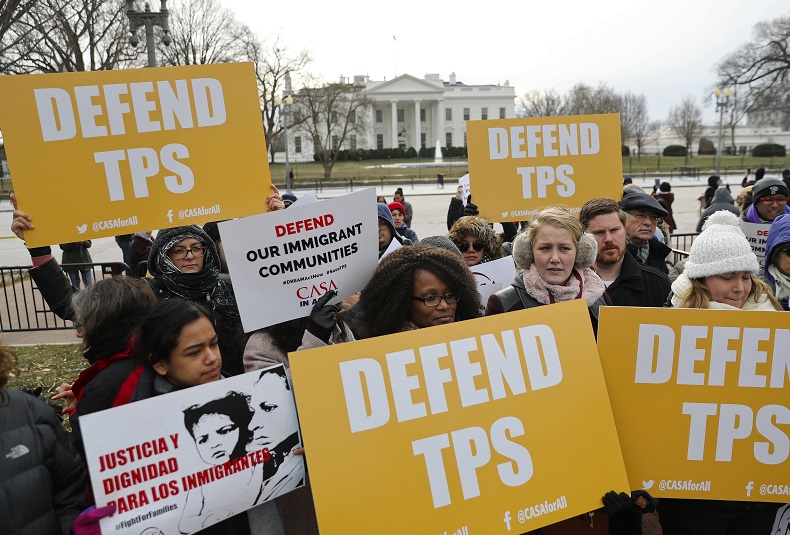It didn’t come as a surprise on Monday, but the Trump administration’s announcement that it will lift temporary protection status for 200,000 citizens of El Salvador could nevertheless have profound consequences for Canada.

Citizens of several other countries — including Haiti, Nicaragua and Sudan — have seen their temporary protection status (TPS) revoked by the U.S. over the past year. The Salvadorans, however, are by far the largest cohort of foreigners living in the U.S. under the program, which allows foreign nationals to remain in the U.S. while their home countries recover from natural disasters, war or other strife.
WATCH: Border officials brace for another spike in asylum seekers crossing into Canada

The loss of TPS for Salvadorans, effective as of early September 2019, will mean that they face deportation if they don’t pack up and leave before that deadline. Many have children who were born in the United States.
The Canadian government has been concerned for months about the possibility of at least some TPS-holders heading north, crossing into Canada between border checkpoints to avoid automatically being sent back to the United States under the Safe Third Country Agreement.
READ MORE: Canada readies for potential refugee influx as U.S. ends protection status for Nicaragua
An influx of thousands of Haitians over the summer seemed to bear out those predictions.
“Those who are determined to be genuinely at risk, are welcomed,” reiterated Hursh Jaswal, spokesperson for Immigration Minister Ahmed Hussen, on Monday.
“Those who are determined not to be in need of Canada’s protection, are removed. For instance, based on cases finalized to date, only eight per cent of asylum claims submitted by Haitians who entered Canada this [past] year are being accepted.”
Ottawa has also been sending parliamentary emissaries south of the border, deploying MPs to major cities with large diaspora communities from the affected countries to try and counter the misinformation spreading on social media about the ease of coming to Canada (the Salvadorans are based mainly in Washington, Los Angeles, New York and Houston).
“We are also implementing a targeted digital campaign, using exclusively search engine marketing, to target specific TPS-affected communities,” Jaswal told Global News.
“We are taking a whole-of government approach and have developed a national operations plan to manage possible scenarios.”
Still 60 to 70 crossings each day: union
While the number of irregular border crossings has fallen steadily in recent months, it isn’t back down to the levels seen in the spring of 2017. Statistics for December are not yet publicly available, but in November, over 1,600 people crossed on foot to make an asylum claim — the vast majority arriving in Lacolle, Que.
According to the head of the union representing Canada’s border guards, about 60 to 70 people are still crossing there each day.
“On Dec. 31, there were 130 that actually crossed,” said Jean-Pierre Fortin. “And you remember the 31st what the weather was like? It was very cold.”
WATCH: Nigerian asylum seekers welcomed with gifts for new home

Temperatures in Lacolle were, in fact, hovering just below -20 C that day.
About three-quarters of the people arriving in recent weeks have been Nigerian, said Fortin, a country not affected by the TPS terminations. But he expects that to change in the spring and summer of this year as the lifting of TPS for El Salvador, Haiti, Nicaragua and possibly Honduras looms on the horizon.
- Life in the forest: How Stanley Park’s longest resident survived a changing landscape
- Bird flu risk to humans an ‘enormous concern,’ WHO says. Here’s what to know
- Roll Up To Win? Tim Hortons says $55K boat win email was ‘human error’
- Election interference worse than government admits, rights coalition says
The union has been saying for months that Ottawa needs to hire more border guards and staff, and given that it takes a minimum of 18 weeks for training, Fortin says time is now of the essence.
Michelle Rempel, the Conservative immigration critic, agrees.
“The Immigration and Refugee Board has processed only five per cent of the claims made by those crossing into Canada,” Rempel said in a statement issued Monday afternoon. “This has led to a ballooning in wait times for refugee hearings, which will result in asylum seekers waiting years in Canada before they complete the asylum process. Additionally, they have amassed a deportations backlog in foreign nationals found to be inadmissible to Canada.”
WATCH: Honduras man seeking refugee status can’t convince immigration officials that he’s gay

The current approach to the problem is neither effective or useful over the long-term, Rempel wrote.
“Instead of turning a blind eye to today’s announcement by the U.S., Trudeau should be standing up to Trump and protecting Canada’s immigration system by closing the loophole in the Safe Third Country agreement.”





Comments